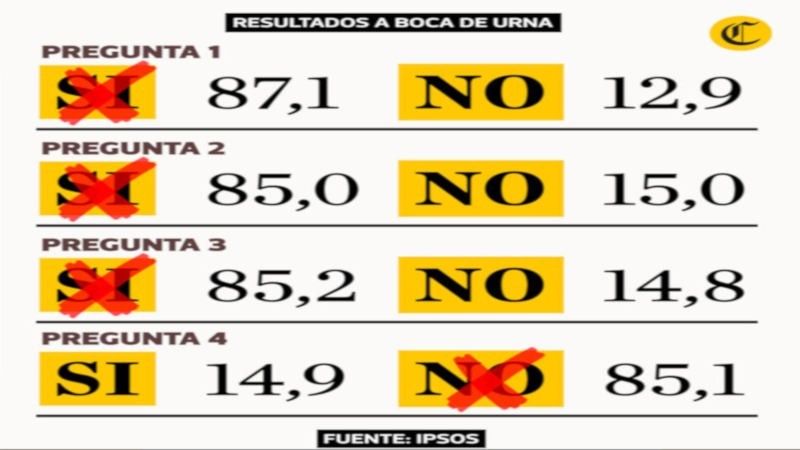Yesterday Peruvians headed to the polls to vote in a constitutional referendum on political and judicial reforms proposed by President Martín Vizcarra and seen by most as measure to end corruption in the country and earn back the people’s trust in the state.
And this is more than necessary.
Why did President Vizcarra propose changes to the Constitution and a referendum?
Over the past two or three years the Odebrecht corruption scandal has shaken up Peru. Four former Peruvian Heads-of-State - including Alejandro Toledo (2001-2006), Alan Garcia (2006-2011), Ollanta Humala (2011-2016) and his wife as well as Pedro Pablo Kuczynski (2016 – 2017), numerous politicians - including Keiko Fujimori, daughter of former President Alberto Fujimori and powerful opposition leader in Congress, high-ranking officials, judges, lawyers and public servants were investigated and sentenced or are still under investigation for taking bribes from the Brazilian construction company Odebrecht.
In Peru Odebrecht had a strong presence and was involved in the construction work for numerous major projects including a part of the Trans-oceanic highway connecting Peru (the Pacific Ocean) with Brazil (the Atlantic Ocean), section 2 of the Metro line in Lima, the Chaglla Hydroelectric Power Plant, the Olmos and Chavimochic irrigation projects, the Vía de Evitamiento road project in Cusco, the port in Matarani, and lots of other bigger and smaller projects.
So, when Odebrecht confessed to having paid more or less US$ 29 million to officials in Peru between 2005 and 2014 during the presidency of Alejandro Toledo, Alan Garcia and Ollanta Humala to secure several construction and engineering projects, and Peruvian anti-corruption prosecutors started to dig and over months found even more on many others, things became tight for the political establishment in Peru and triggered great resentment and outrage in the population. Leaked wiretaps proving special arrangements and dirty deals of congress members, public servants, judges, lawyers and entrepreneurs were the last straw provoking public fury and rage. People in Peru were finally fed up with the corruption in the country.
Since taking office in March 2018 after the resignation of former President Pedro Pablo Kuczynski, Martín Vizcarra promised to fight and end corruption in Peru; not an easy target in a political and judicial system and even a society where corruption and bribery is enshrined. But with the situation getting increasingly out of hand, he took a critical step and decided to include Peruvians in the decision on how to move forward.
Vizcarra proposed a four-part referendum where Peruvian voters could decide on how judges and prosecutors are appointed, on the regulation of the financing of political parties, on prohibiting the immediate re-election of congress members and on replacing the unicameral Peruvian Congress by a bicameral body.
And yesterday the Peruvian public decided.
Results of the referendum on political and judicial reforms in Peru
87.1% of Peruvians voted for the proposed reform of the judicial system. Instead of judges and prosecutors being elected, approved and removed by the National Council of Judges, in the future the public will choose the members of a new judicial council, called National Board of Justice, and vote on nominated officials. A reform that analysts consider bringing substantial change.
Additionally, 85% of Peruvians voted in favor of stricter financing regulations for political parties in Peru. So, in the future political parties can’t receive contributions from illegal and anonymous sources nor from anyone convicted.
Furthermore, 85.2% supported the end of immediate re-election of congress members after their 5-year term. As Peruvians consider Congress the most corrupt institution in the country and the re-election rate is only about 30%, this reform is more of symbolic nature.
And last but not least, the proposal to replace the country’s unicameral congress by a bicameral body - which was weakened by the opposition and in the end wasn’t even supported by Vizcarra himself anymore – failed with only 14.9% of the votes.
What's next?
While a referendum alone won’t solve Peru’s current political problems, it’s a good start and consolidates the President’s power. Now it’s up to Vizcarra to get to work and fully implement the reforms.
The Peruvian Head-of-State already thanked voters for their trust and assured his commitment to respecting the citizens’ will. He also stressed that while the referendum was extremely important, it won’t change anything by itself. In the coming days he will address the nation to inform about the government’s next steps to begin the change Peru and Peruvians desire.


